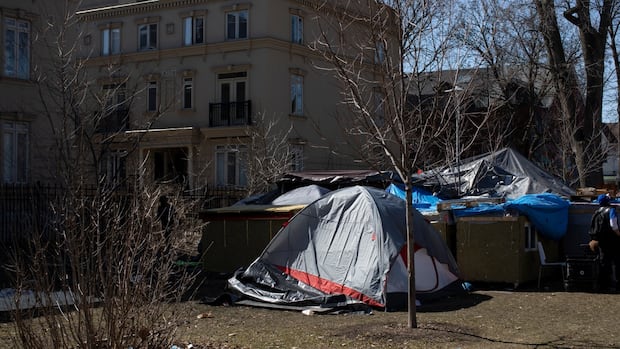When Dan was released from the Toronto South Detention Centre last December after serving about 60 days, he was given a TTC token and sent on his way. He walked to a bus stop, but he had nowhere to go.
“There’s no plan,” Dan said. “I’m a criminal, right? Nobody wants me.”
Dan, who was convicted of theft and failure to comply, wandered all night before going to an encampment. CBC Toronto isn’t disclosing Dan’s last name because he fears it could affect his chances of getting employment.
Since then, Dan has alternated between staying with friends and living outside. That means it is difficult to get his life organized, attend appointments and have a cell phone without it being stolen, he says. If he falls asleep while it is charging in a public place, it’s gone when he wakes up.
“As soon as I caught a charge and was guilty, every sort of good thing going for me dried up,” he said.
Dan, who was homeless before he went into jail, said supports such as provincial transitional housing similar to federal halfway houses, might have helped. He would have liked “just the stability of having somewhere to go” — a safe place to leave his belongings.
Not having a plan means “you are right back in the hole you started in,” he said.
Our provincial criminal legal system is really contributing to the crisis.– Safiyah Husein, director of policy for John Howard Society Ontario
Dan is not alone. A new report released Thursday by the John Howard Society of Ontario says, in one year, thousands of people became homeless immediately upon release from Ontario jails. The society is a charity that works to build a safer Ontario.
The report, entitled From Incarceration to Encampment, found that provincial jails had 7,455 releases in 2023-2024 of people with no fixed address, meaning they had no housing. The number doesn’t necessarily represent individual people because some people are admitted and released several times in one year, the report says.
The report calls on the Ontario government to set up a provincial transitional housing system for people released from its correctional facilities.
‘Housing is crucial to reintegration,’ policy director says
Safiyah Husein, the society’s director of policy, said the report reveals a “deep link” between incarceration and homelessness in Ontario. She said it shows that people who spend time in jail need a “pathway” to help them reintegrate into society. And it puts a number on an urgent issue that requires a systemic government response, she said.
“A lot of people are flagged as having no fixed address or lacking stable housing upon admissions to correctional institutions. And then most of these people will be released straight onto the streets the day that they get out of jail. And with no supports, they might end up in shelters or encampments, but that’s no place to rebuild a life,” she said.
The report says people may be homeless upon release if they didn’t have housing when they were admitted to jails, if they lost their housing while incarcerated, or if they were unable to return to their previous housing, sometimes due to release conditions.
“Housing is crucial to reintegration. And so with the lack of supports, a lack of housing, that increases the risk of reoffending and winding up right back in jail.”
Husein said some people in jail might lose their employment, while others might have their income assistance cut off. She added that it is important to remember that a large percentage of people in Ontario jails are awaiting trial and have not been convicted of a crime.
“There are long-term impacts to losing housing when an individual is jailed, even for a short period of time,” she said.
According to the report, the lack of housing for those released from jail has an impact on the larger society too.
“Thousands of people are discharged into homelessness from provincial correctional institutions every year, returning to communities across Ontario. Without housing, individuals end up in shelters, encampments or sleeping rough,” the report says.
“Individuals released into homelessness are more likely to reoffend, compromising public safety and entrenching individuals in a revolving door of jail and the streets.”
Husein said the report urges the province to take action.
“This report really highlights a pretty troubling but hidden fact about our homelessness and housing crisis in that our provincial criminal legal system is really contributing to the crisis,” she said.
Ontario government pledges to review report
The report recommends that the province:
- Create transitional housing for people released from Ontario jails, similar to federal community-based residential facilities known as halfway houses.
- Update its policy directives for Ontario Works and the Ontario Disability Support Program so that recipients in jail would not be cut off but instead receive benefits for up to three months.
- Launch a campaign to encourage landlords to stop discriminating against those who have been involved in the criminal justice system.
Ontario’s Ministry of the Solicitor General said in a statement Wednesday that it will review the report.
It says the province is investing $75.5 million to provide access to safe, secure accommodations for people experiencing homeless, along with “wrap-around supports.” That’s on top of creating 1,239 more housing units, 815 supportive housing units and 971 additional shelter spaces, it said.
“This is in addition to the $1.7 billion we are investing to improve access to supportive housing, including through the Homelessness Prevention Program, which helps municipalities deliver programs tailored to local needs,” the ministry said in the statement.
“Our government’s bold action to create 28 new Homelessness and Addiction Recovery Treatment Hubs is also adding 560 highly supportive housing units, in addition to addiction recovery and treatment beds, helping thousands of people each year transition to more stable long-term housing.”

Keith Hambly, CEO of Fred Victor, a multi-service agency in Toronto, said he is not surprised by the lack of housing for formerly incarcerated people.
“What is truly needed in this case, and in many cases of homelessness, is a level of housing and supportive housing that works with people where they’re at, that works with their mental health issues that may be presenting, or substance use issues, or even issues of long term trauma. Or else the story repeats itself,” Hambly said.
Elizabeth McIsaac, president of Maytree, a foundation committed to finding solutions to poverty, said the number of people in a given year being released from jail into homelessness is “terrible.” Maytree sponsored the report.
“We need a system that helps people get on track because it’s what’s right for the individual, it’s what’s fair, it’s what’s going to produce better outcomes in their lives. And by the way, it’s going to cost a lot less than continuing to send people back into prison, back into incarceration, and cycling through over and over again.”







